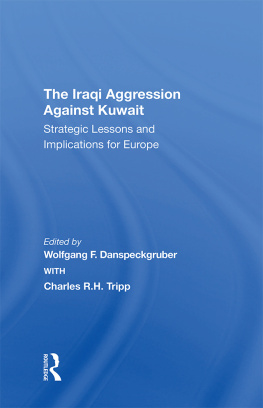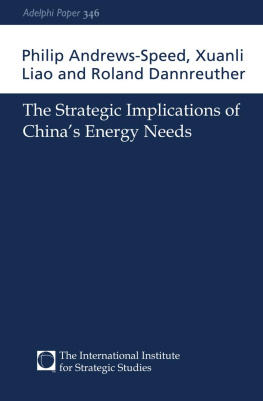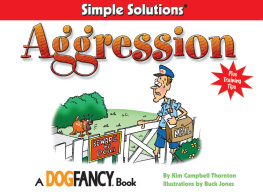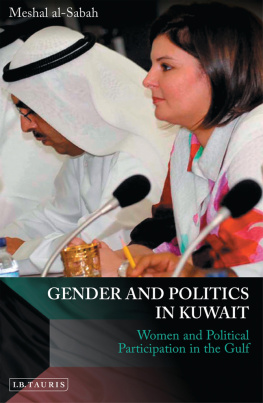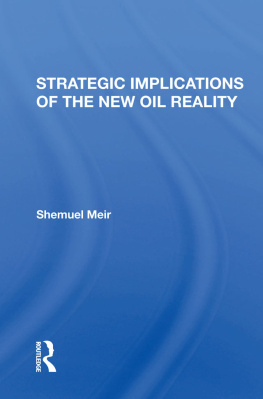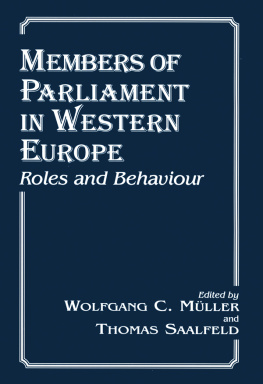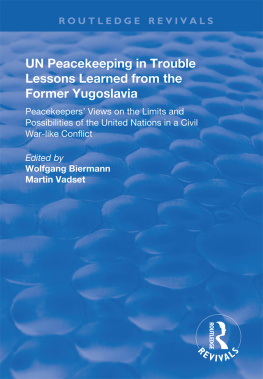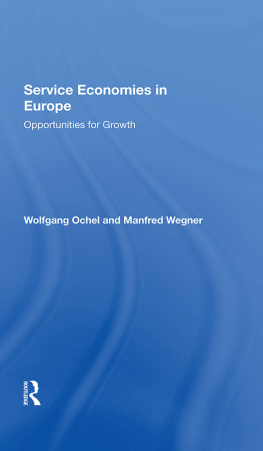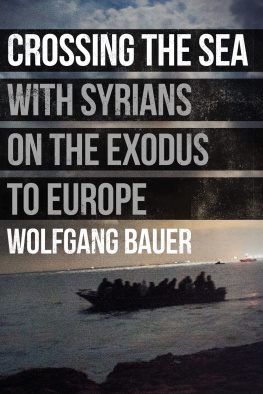First published 1996 by Westview Press
Published 2019 by Routledge
52 Vanderbilt Avenue, New York, NY 10017
2 Park Square, Milton Park, Abingdon, Oxon OX14 4RN
Routledge is an imprint of the Taylor & Francis Group, an informa business
Copyright 1996 Taylor & Francis
All rights reserved. No part of this book may be reprinted or reproduced or utilised in any form or by any electronic, mechanical, or other means, now known or hereafter invented, including photocopying and recording, or in any information storage or retrieval system, without permission in writing from the publishers.
Notice:
Product or corporate names may be trademarks or registered trademarks, and are used only for identification and explanation without intent to infringe.
A CIP catalog record for this book is available from the Library of Congress
ISBN 13: 978-0-367-29325-3 (hbk)
Abdlatif Y. Al-Hamad
As the decade of 1990s dawned, the promise of a healthier and more peaceful new world filled the air. The transformation of relations between East and West provided a unique opportunity for a new kind of coopera-tion in the face of global challenges. Dtente between the superpowers promised a peace dividend by freeing up substantial resources from mili-tary expenditures. In Europe, countries that had been longtime rivals moved toward greater cooperation and established an economic union in 1992. Eastern Europeans discarded the shackles of communism and of central governments bogged down by bureaucracy and inefficiencies. In Asia, Japan became the world's new financial superpower and the leader of an important industrial bloc consisting of the emerging new industrial-ized countries in East Asia.
On the Arab scene, the 1990s looked equally promising. Several Arab countries had entered into economic partnership, culminating in the formation of two regional economic blocs in addition to the then eight-yearold Gulf Cooperation Council. These were the Arab Cooperation Council, which brought together Jordan, Iraq, Egypt, and Yemen, and the Maghreb Cooperation Council, formed between Algeria, Morocco, Tunisia, Libya, and Mauritania. These institutional frameworks were viewed as the catalyst that would bring about more realistic and sustainable economic integration among Arab states. By then, Egypt, which after the Camp David accord had been isolated from Arab forums, was once again fully reinstated in Arab mainstream activities. The Arab countries were looking forward to a buoyant decade especially as the 1988 cease-fire between Iraq and Iran had removed the greatest source of instability in the region. Oil prices, which had crashed in 1986, were stabilized, and there was the likelihood of increase throughout the 199Os.
This great promise and hope was shattered with the march of the Iraqi army into Kuwait on August 2, 1990. That act of aggression and the ensuing crisis not only brought dismal and total catastrophe to both countries and to their neighbors, but it also proved to be the catalyst that brought the economy of many countries to the brink of collapse, especially in East Asia and the Middle East. The losses and suffering inflicted on the Kuwaiti and Iraqi economies have, indeed, been enormous, and the recovery will be extremely difficult. The adverse impact of the Kuwait crisis on the economies of Egypt, Jordan, Turkey, Syria, and Yemen will be severe and long lasting.
The losses incurred by the Kuwaiti oil sector alone could amount to $100 billion, of which between $15 to $20 billion will be the cost of reconstruction of the oil industry. With no fewer than 750 damaged oil wells, Kuwait's daily losses during the Iraqi occupation and the ensuing combat were between $90 and $100 million from fire and spillage. It is estimated that between four and six million barrels of oil a day were lost. The damage to the oil refineries was estimated to be around 20 percent of their capacity, which had been seven hundred thousand barrels of oil per day. The damage to Kuwait's infrastructure, industry, agriculture, transportation, and other facilities was estimated by a UN special mission at no less than $15 billion. But Kuwait's losses far surpass these physical and financial damages, as the cost of the immense environmental destruction and human suffering could not be accurately assessed.
Iraqi losses are no less daunting. These include the thousands of casualties resulting from the Iran-Iraq War and the invasion of Kuwait. Of the $100 billion Iraq spent on arms since 1980, more than $80 billion was provided by foreign borrowings, of which $50 billion came from Saudi Arabia, Kuwait, and other Gulf countries. Iraq has nothing to show for this major economic burden: It has to rebuild its infrastructure, oil installations, power plants, and electric networks, which were destroyed by military action in the Gulf War. In addition, the physical destruction and production losses in Iraq due to the Iraq-Iran War, estimated to be in the range of $37 billion, require major reforms and investments in the economy if a reasonably productive capacity is to be restored.
The invasion of Kuwait not only affected Kuwait and Iraq but also inflicted serious damage on the economies of neighboring countries. The stability of the economies of Arab countries in the region that either supplied labor to the Gulf countries or relied heavily on external economic and financial support from the Gulf countries was seriously damaged. The full effect of the Gulf crisis on these countries could lead to economic disruptions and social upheaval. It is estimated that the losses incurred by Egypt, Jordan, and Syria total about $13 billion$8.5 billion for Egypt and $2.2 billion each for Jordan and Syria.
Workers' remittances from abroad constitute on average about one third of Jordan's foreign exchange earnings ($872 million per annum during the period between 1986 and 1989). The average is about $2 billion annually for Egypt, thus accounting for 40 percent of its total foreign exchange receipts, and about $1 billion for Syria. These countries rely on the Gulf states as well for substantial financial assistance to support budget deficits and improve balance of payments positions. Financial assistance of the Gulf states to other Arab countries was on average about $6.4 billion per annum from 1985 to 1989, of which 86 percent was from Saudi Arabia and Kuwait alone. Jordan received about $1.7 billion; $1.8 billion went to Syria; and the Sudan and Yemen received $741 million and $500 million, respectively.


